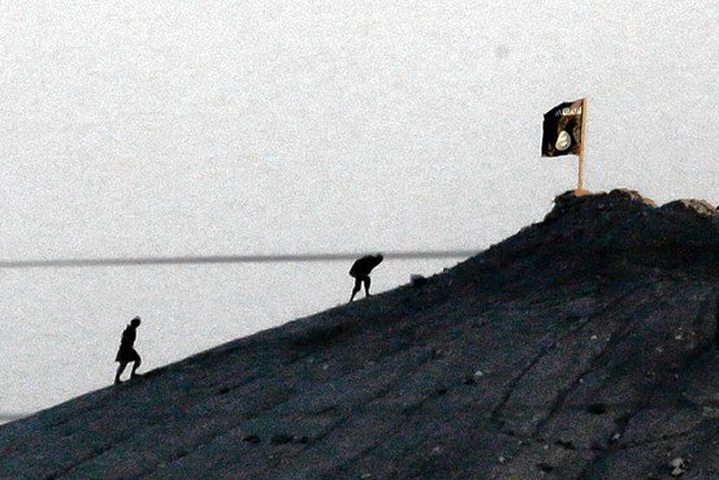Islamic State Wages Battle in Syrian City of Kobani Near Border With Turkey

Islamic State fighters planted their flag near Ayn al-Arab, Syria, Monday, clearly visible ...
Islamic State has captured more than 300 Syrian Kurdish villages around the city, also known as Ayn al-Arab, over the past three weeks. But Monday was the first time the group entered the outskirts of the city near the Turkish border—a show of strength in the face of weeks of air attacks by the U.S. and its allies on Islamic State targets inside Syria.
The militants raised two of their black flags—one on top of a civilian apartment building and another on a hilltop near a checkpoint at the city’s eastern entrance. This brought them within about a mile of the city center, said Meysa Abdo, a local commander of the Syrian Kurdish militia known as the Syrian Kurdish People’s Defense Units, or YPG. The standard above the checkpoint could be seen from villages inside Turkey.
The U.S. Central Command said Monday that it had conducted an airstrike south of Kobani and destroyed two fighting positions of Islamic State, also known as ISIS or ISIL.
“We’re working closely to do everything we can to help push back ISIL in this part of the country,” said State Department spokeswoman Jen Psaki.
That attack and several others in the same area in recent days represent departures from the U.S. policy of conducting strikes in Syria to degrade the capabilities of Islamic State militants operating in neighboring Iraq.
However, the U.S. strikes in the area have failed to blunt Islamic State’s offensive and State Department officials said top U.S. officials will hold meetings in Turkey this week on the international coalition forming to counter the extremist offensive. Retired Marine Gen. John Allen, the Obama administration’s special envoy in the fight against Islamic State, and Brett McGurk, deputy assistant secretary of state, are traveling to Turkey.
The U.S. has been pressing Turkey to take a more active role in the coalition. The Turkish parliament last week granted the government a virtually free hand in dealing with any threats against Turkey from Syria or Iraq, including cross-border operations and deploying foreign troops inside Turkey.
Turkish Prime Minister Ahmet Davutoglu said in an interview with CNN on Monday that Turkey would take all measures possible to counter any threat against its security. He reiterated his country’s demand that the U.S.-led coalition also go after Syrian President Bashar al-Assad as well as Islamic State.
“We are ready to do everything if there is a clear strategy that after ISIS, we can be sure that our border will be protected,” Mr. Davutoglu said. “We don’t want the [Syrian] regime anymore in our border pushing people toward Turkey,” he said, referring to the two million Syrian refugees currently in Turkey.
In the past three weeks alone, the onslaught around Kobani has sent more than 180,000 refugees from northern Syria pouring across the border into Turkey.
Stray bullets and mortars have landed on the Turkish side of the border in the past few days of fighting, wounding two people. Turkish security forces have evacuated residential areas and relocated refugee camps for civilians who fled Kobani, pushing them back from the border, Turkish officials said.
In fighting on Monday, Islamic State attacked Kurdish fighters in two neighborhoods on Kobani’s eastern outskirts, Kurdish commanders said.
“These neighborhoods are Kobani’s shantytowns and there are still civilians there who couldn’t flee,” said Ismet Sheikh Hasan, a senior defense official in the Syrian Kurdish region. “Street clashes in the city may start any moment now.”
He said the U.S.-led coalition conducted airstrikes in the area around 2 a.m. local time on Monday, but it wasn’t clear whether they had any effect.
“We haven't received military aid nor humanitarian aid, and we don’t know what these random airstrikes have succeeded in doing,” Mr. Hasan said. “This nation is basically fighting all on its own against Islamic State,” he said of the Kurds.
The fall of Kobani would threaten the security of the whole semiautonomous Kurdish-majority region in northern Syria, known in Kurdish as Rojava, Kurdish commanders and analysts said.
Islamic State intensified attacks on the city last week in a failed bid to fulfill a pledge that it would hold prayers in the city to commemorate the Muslim feast of Eid al-Adha.
“We will try and take the checkpoint back, as with all other parts taken by Islamic State,” Mr. Abdo said.
Many residents of another Kurdish city, Afrin, have already packed their documents and valuables, preparing to flee if Islamic State takes Kobani, refugees in Turkey said.
Kurdish fighters have called for international military aid, saying the occasional coalition airstrikes near Kobani have done little to deter the better-armed Islamic State.
But any military aid to the YPG is complicated by the group’s links to the Kurdistan Workers’ Party, or PKK, which is listed as a terrorist organization by the U.S., Turkey, and the European Union. The Turkish government has held fragile peace talks with the PKK for nearly two years, after a three-decade conflict that has claimed some 40,000 lives.
The jailed PKK leader Abdullah Ocalan warned last week that the fall of Kobani would bring the peace process to a violent end, accusing the Turkish government of deliberately helping Islamic State against the Kurds to prevent the “revolution in Rojava.”
Thousands of Turkish Kurds have traveled to Syria to defend Kobani.
Speaking at a news conference in Warsaw, the new secretary-general of the North Atlantic Treaty Organization tried to assure Turkey the alliance would support its fellow member if violence spills over from Syria.
Jens Stoltenberg said NATO’s main responsibility is to protect all allied countries, adding that the organization has deployed Patriot missiles in Turkey to enhance its air defense.
“The Turks know that NATO will be there if there is any spillover and attacks on Turkey as a consequence of the violence we see in Syria,” he said.





